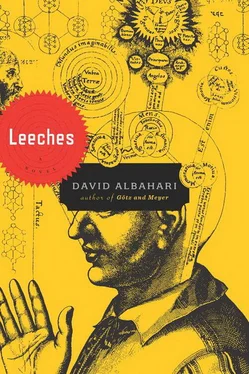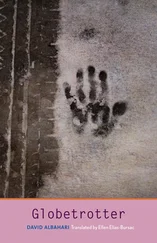košava wind, though the day wasn't windy, and the other automatically lifted her hand to smooth her hair. A young girl on a bike rang her bell, then asked us to let her pass. High above, an airplane moved across the sky, leaving a shaggy trail, while along the river a boat slid by, reflected in the surface, so at one moment I thought that the boat underneath, not the real one, was carrying the one above. I wondered where Marko was, whether he had already reached home and whether he would be angry the next day when I went looking for him. Why the next day, I said out loud, I could see him tonight. An old woman sitting on a bench gave me a sharp look, then shook her head. She was knitting. The woman sitting next to her was crocheting. Of the dozen electric cars, only one was being used by two little girls waiting for the ride to begin. On the path someone had written WHOEVER LOVES VESNA MUST BE CRAZY in chalk. I passed by an inflated slide in the shape of a four-sided giraffe, near which a foul-smelling compressor was rumbling, and then the entire hillside stretched out in front of me. The people I'd seen from the window of the high-rise were still on the slope, perhaps more closely packed than before and still forming an irregular circle. The only difference, I thought as I walked toward them across the grass, was that no one was standing inside the circle. In fact,
circle is not the right word, I saw as I got closer, and what had seemed from afar, from the window of the high-rise, to be an irregular circle was actually a complicated arrangement of men and women, a human stripe circling the entire small hill and slowly dispersing. The people from the group were gradually, unhurriedly, leaving their places, but efficiently enough that by the time I'd climbed to the top of the hill, there was no one left. The last couple, a graying man and a young woman who resembled him, passed me on my way up the slope. I stood by the old metal pillars alone, my ears humming as if I were standing at the foot of a church tower. For several minutes more I could follow the people as they moved away from the hill; soon enough, however, they began to mingle with those out walking, and when I looked back, the grassy surfaces were empty. I touched my pocket again. Go home, I said to myself softly, through my teeth, go home. I turned, walked down the hill, and headed toward the Danube riverbank. As I was crossing the path, I nearly bumped into a little girl on a bike, perhaps the same girl on her way back to the high-rises. I reached the steps, sat on the lowest one, so that my feet were nearly in the water, pulled the letter from my pocket, and tore open the envelope. The letter was short, disappointingly short, it contained three sentences. The first I knew well. A dream uninterpreted, was written in large, even letters, is like a letter unread. A letter when read, the second sentence began, opens the way to dreams. If dreams are not dreams, read the third sentence, what are they? Such expectation, I thought, only to find myself faced with yet another question. Maybe I should crumple up the letter, I thought, and toss it into the water? I was angry, really angry, which, hand on heart, was funny, because a person who receives a letter never determines what's in the letter, but once he opens it, there is no going back, because regardless of how hard he tries to stuff that letter back into the envelope, it can never be as it was, even if he reseals the envelope so expertly that it fools the naked eye. I didn't crumple it up, though for a while longer I toyed with the idea of folding it into a paper boat. A letter from an unknown sender headed in an unknown direction, and the twofold indeterminacy suddenly became a source of comfort to me. I folded it carefully, slid it back into the envelope, stood up, and tucked it into my pocket. A wave that splashed against the steps splashed my sneakers. When I climbed to the top of the steps and looked back, I saw wet footprints leading straight to my feet. Someone's following me, I thought, and then burst out laughing. I laughed again every time I recalled the thought, especially as I was walking by the old woman knitting. Hearing my chuckles, she looked up and shook her head. The woman who was crocheting didn't move. She's deaf, I thought, but then, as I reached the high-rise, I realized that someone was, indeed, following me. Suddenly I was sure that someone behind me was making an effort to keep me in sight. I was next to the first of the high-rises, not far from the spot where it all began, and I could see the playground and the parents shouting greetings and encouragement to the children in the caterpillar train. There was a man somewhere here, I thought, in a black trench coat, standing by the seesaw or the wooden horse with the broken ear, watching a woman who has just stepped into the water. I spun around, my hands raised high as if ready to strike a karate blow, and one of the people out for a walk said quite audibly, He is crazy. I'm not crazy, I said, though I was hardly convincing. The little train had meanwhile come to a stop and the children were getting off, shrieking, jostling with the children who were getting on for the next ride. Go home, I whispered again to myself, go home, and I headed home, though I sensed that someone, keeping a careful distance, was eyeing the back of my head. There are things one should ignore, I said to Jaša Alkalaj the next day, and that is the best way that they, at least for a moment, cease to exist. I suppose, said Jaša, without conviction. He got up and went to the window and looked out. We were sitting in his studio waiting for Dacca, placing bets on whether he would come wearing a hat. I had not seen old Dača since the encounter in the yard of the Belgrade synagogue, and this time, at least so Jaša Alkalaj said, Dacca had asked to see me, though Jaša didn't know why. I told him I had been to the Jewish cemetery, that I had seen the traces of vandalism, and that I didn't understand why he had been ambivalent about my going. It would be better, he said, for us to have some brandy, and went over to the shelf with bottles. He had told me, I reminded him, that the dead don't lie, and that their truth must be honored. But, said Jaša, to honor the truth there have to be people who wish to honor it. At the end of July last year several tombstones were knocked over at the Zemun Jewish cemetery, others were defaced, some soiled, and ever since, he said, there has been no end to it. I can speak anywhere I please, he said, and be listened to with the greatest commiseration, but short of head shaking and maybe even some clucking, nothing happens, despite their promises, he said, despite the promises they offer, not one of them will lift a finger. These are times, he added, when there is a lot of talk, and when there is a lot of talk, little gets done. He put three glasses on the table and began to pour the brandy, but his hand shook so hard he had to stop. I took the bottle and filled the shot glasses nearly to the brim. For every thing, Jaša Alkalaj said, there is a season, and life is, in essence, the skill of matching the season to the thing. Now is not the season for cemeteries, he added, let's hope the dead won't hold it against us. Then suddenly, in a bright voice, he announced Dača's arrival and in a gulp he downed the brandy. Dača was wearing his hat, though we couldn't remember who had bet that he would, so even Dača's willingness to wait outside the door while we placed our bets again could not take us back to our earlier levity. The brandy, in its unpredictable way, closed off every path and thoroughfare to a brighter mood, and soon all three of us were darkly silent, clutching our shot glasses. Cemeteries are bottomless wells, said Jaša, and if you begin to talk about them, you have no choice but to go on falling. I perked up my ears when I heard the word
well.Читать дальше







![David Jagusson - Fesselspiele mit Meister David [Hardcore BDSM]](/books/486693/david-jagusson-fesselspiele-mit-meister-david-har-thumb.webp)




